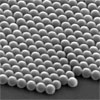
Polystyrene microspheres present a flexible platform for applications in diagnostics and bioseparations. They may be coated with recognition molecules, such as antibodies, antigens, peptides, or nucleic acid probes, and can be loaded with hydrophobic dyes and other compounds. Unmodified polymer spheres also find extensive use as standards for instrument set-up and calibration. Available in diameters ranging from 20nm to 200µm, products exhibit excellent size uniformity.
Plain polystyrene microspheres are ideal for protein adsorption, and have been utilized in a range of diagnostic tests and assays. Surface modified microspheres are available with carboxyl or primary amine groups for covalent ligand attachment. Affinity binding systems offer simple and efficient ligand attachment. Coatings of Fc binding proteins are able to orient antibodies for optimal activity, and streptavidin offers extremely stable attachment of biotinylated molecules, such as proteins, peptides, and oligonucleotides.
Microsphere Reagent Develoment
Assay Development
Tech Note 204, Adsorption to Microspheres
Tech Note 205, Covalent Coupling
Full Technical Library
TSD 0021, Material Properties of Polystyrene and Poly(methyl methacrylate)(PMMA) Microspheres
TSD0022, Physical Properties of Polymer & Silica
TSD 0023, Common Solvents and Non-solvents of Polystyrene
